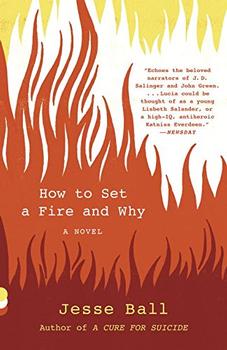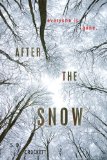Summary | Excerpt | Reviews | Beyond the book | Read-Alikes | Genres & Themes | Author Bio

It's been a long while since a thriller made me think; presented me with complex issues even while I was hungrily turning pages to get onto the next step. But Michael Burgess's young adult novel, The Hit – about Adam, a 17-year-old Manchester youth who goes on a weeklong drug-addled bender knowing he will die at the end of it – does just that. Indeed, now that I think of it, reading the book is a bit like taking a weeklong trip. Except, of course, you're chomping down the pages so quickly that it's possible to finish it in one sitting. I did.
Because, for starters, Burgess's writing is ready to go. To stick with my metaphor, it's fast food with gourmet complexity. As we're getting to know Adam, he is at the stage of life where reality is starting to dim his youthful optimism. He is simultaneously yearning to be an adult but still clinging to childlike fantasy. Simply put, "He's a brilliant [football] player but now he was having to come to terms with the fact that there were too many others more brilliant than him." Even so, "He could still make it if he tried."
And that's just his personal life. His family's a shambles. Father, incapacitated by a work injury, idles his time watching television. Mother drags her defeated self home each morning from a crap third shift job in telesales; her meager wages aren't enough to keep body and soul together. So the family relies on the mysterious older brother Jess. Jess, who at the outset is portrayed as disconnected from the family, is the one who can also mysteriously procure front row seat tickets to a sold-out rock concert so Adam can impress his girlfriend Lizzie.
The concert kicks off the action with the intentional drug-induced onstage death of Jimmy Earle, a blasé teen idol. He's taken a drug known on the street as Death. Developed for terminally ill people, it offers a week's worth of bliss followed by literal death on day seven. This guy, who Adam believes has everything to live for, is making a political statement. Earle is … or was connected to a group known as the Zealots, an underground Occupy-like organization planning a revolution against the richest one percent. Simultaneous with Earle's concert death they fire their opening salvo of said revolution by passing out handfuls of Death capsules to the audience and to crowds of teens on the streets of Manchester. Riots break out. Clearly it's not just Adam and his family in shambles. It's everywhere, and disenfranchised kids, Earle's fans for starters, are swallowing the deadly capsules because…Hmm.
That's the first curve Burgess throws. Now I want to stop and think about that. Why are these kids doing this? They know there is no antidote. It's not a gamble. Not a cheap thrill. The cost is dear. There's no time to ponder because, worse luck, Adam's fragile hold on a normal-for-him life takes a header. The family learns that Jess has been a secret member of the Zealots and he is reported dead, a casualty in their revolution against the rich and powerful. Their brother/son is gone, taking with him the family's only hope to keep Adam in school. Now he's got to grow up. Get a job. So. No football. No school. And then Lizzie drops Adam.
Frustrated, furious, freefalling, Adam is determined to learn more about his brother and this untimely death. In that endeavor a bag of Death pills falls into his hands. Back in his bedroom he puts one on the tip of his tongue, closes his mouth. "It tasted acrid." He swallows. "What had he done? Not much, he thought. What had he to lose? Not much. A shit life."
Okay, it's one thing to ponder about a crazed crowd of teens getting caught up in the crazy spirit of the herd. It's quite another to think about our protagonist who, in the cold clear light of day in his very own bedroom in a home where his overstressed parents clearly love him, takes a pill that promises Death. Sure there's seven blissfully happy days. But, death? Of course, all hell breaks loose. There's Lizzie and Adam's "bucket list" (Topping the list: Lose virginity with Lizzie) and a gang of cartoonish thugs responsible for the manufacture and distribution of these drugs and, of course, the Revolution, now with a capitol R. Talk about freefalling. The ensuing cascade of events, missteps, mishaps and blind alleys all makes for a thrilling read. Pages flying by in the frenzy of it all.
This is a book that I think would speak to the adolescent reader in a tone and voice that is, as I said, easy and straightforward. The third person narrative style means we're not getting just a single point of view, we get to jump into everybody's head which ramps up characterization. So, what's not to love? Take a point off because there are a couple bits that stretch credulity (no spoilers) and detract from the flow. But overall, excepting those minor manipulations, The Hit is a worthy read.
![]() This review
first ran in the March 19, 2014
issue of BookBrowse Recommends.
This review
first ran in the March 19, 2014
issue of BookBrowse Recommends.

If you liked The Hit, try these:

by Jesse Ball
Published 2017
A singular, blistering novel about a teenage girl who has lost everything - and will burn anything.

by S. D. Crockett
Published 2013
After the extremely hard winter of 2009, S. D. Crockett asked herself, "What if winter never ended?" and from that thought, her debut novel, After the Snow, was born.
Your guide toexceptional books
BookBrowse seeks out and recommends the best in contemporary fiction and nonfiction—books that not only engage and entertain but also deepen our understanding of ourselves and the world around us.